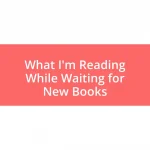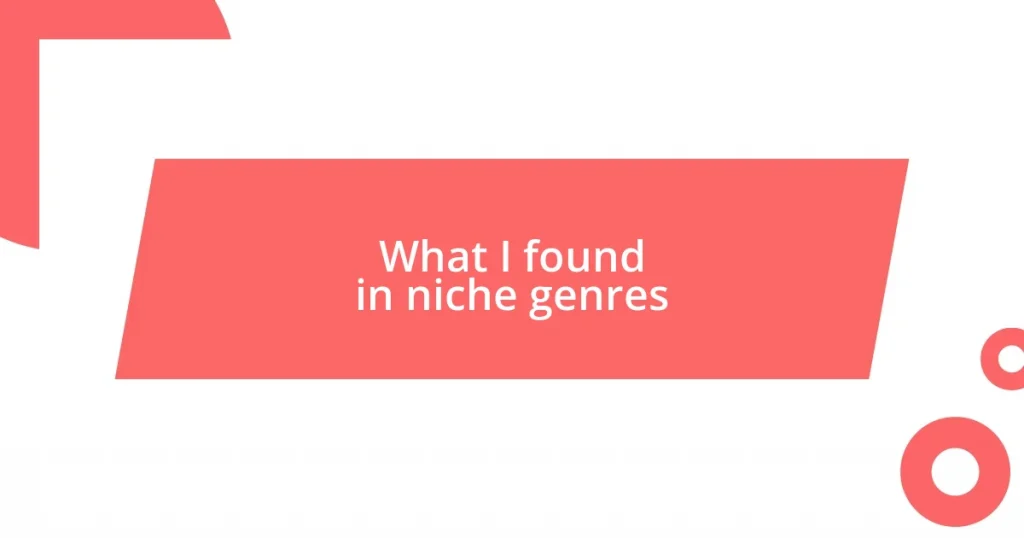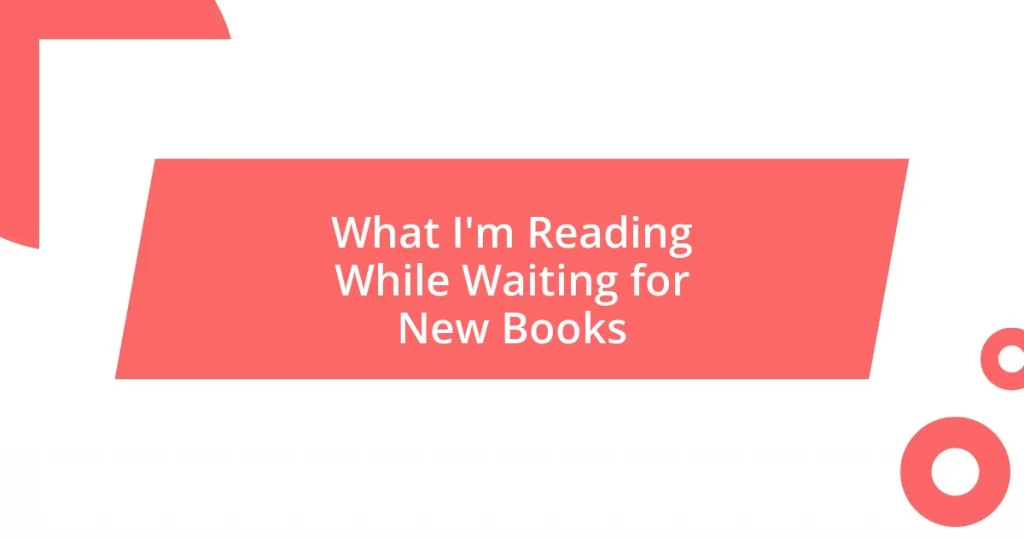Key takeaways:
- Niche genres uniquely cater to specific audiences, creating a sense of connection and exploration through diverse storytelling.
- Current trends emphasize representation, inclusivity, and emotional themes, reflecting societal shifts and readers’ personal experiences.
- Engaging with niche communities fosters collaboration and deep connections, enhancing the overall reading and creative experience.
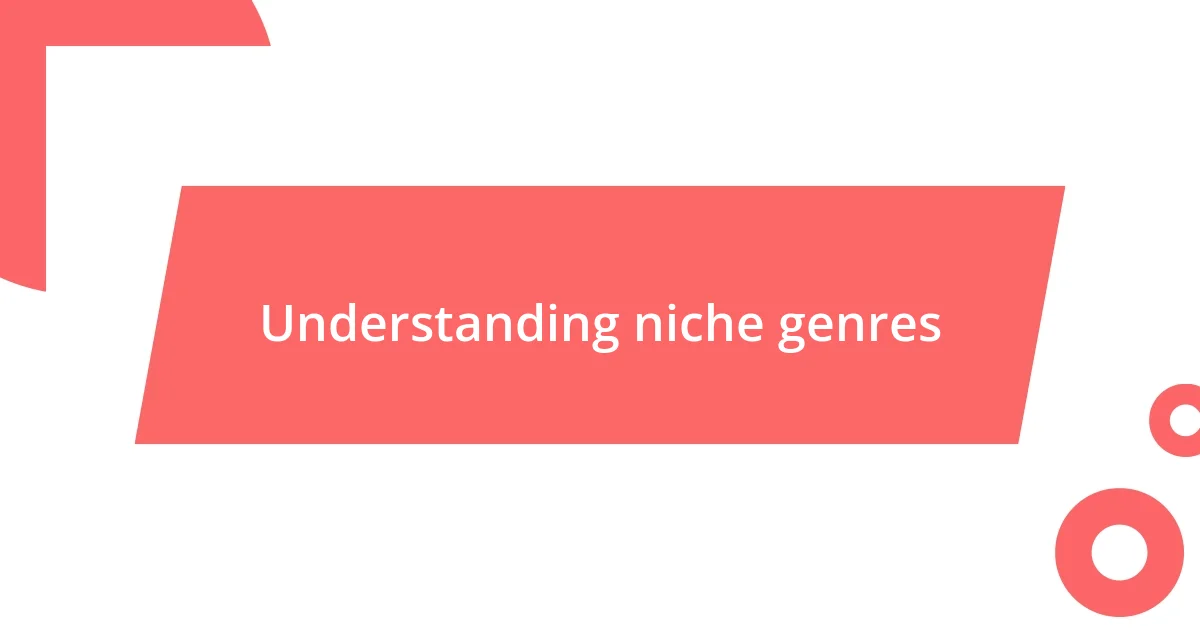
Understanding niche genres
Niche genres can often feel like hidden treasures, waiting to be discovered by those willing to dig a little deeper. I remember the first time I stumbled upon a cozy mystery series; it was as if the author had written it just for me, capturing my love for puzzles wrapped in a warm, inviting setting. Isn’t it fascinating how a specific niche can resonate so strongly with our individual interests?
What makes niche genres so captivating is their ability to cater to specific audiences. Think about it—each genre often has its unique quirks and conventions that can draw in a passionate community. For instance, I found myself enthralled by the unique world of speculative fiction, where every story challenges the boundaries of reality and imagines possibilities I never thought about. Have you ever felt completely immersed in a genre that seemed to speak your language and reflect your innermost curiosities?
Sometimes, exploring these genres opens up new emotional landscapes we never knew existed. I recall diving into a historical fiction piece set in a time long past, which transported me not just geographically but emotionally as well. Can you remember a story that touched you in a way that felt deeply personal? Niche genres often tap into our shared experiences, making us feel connected in an increasingly fragmented world.
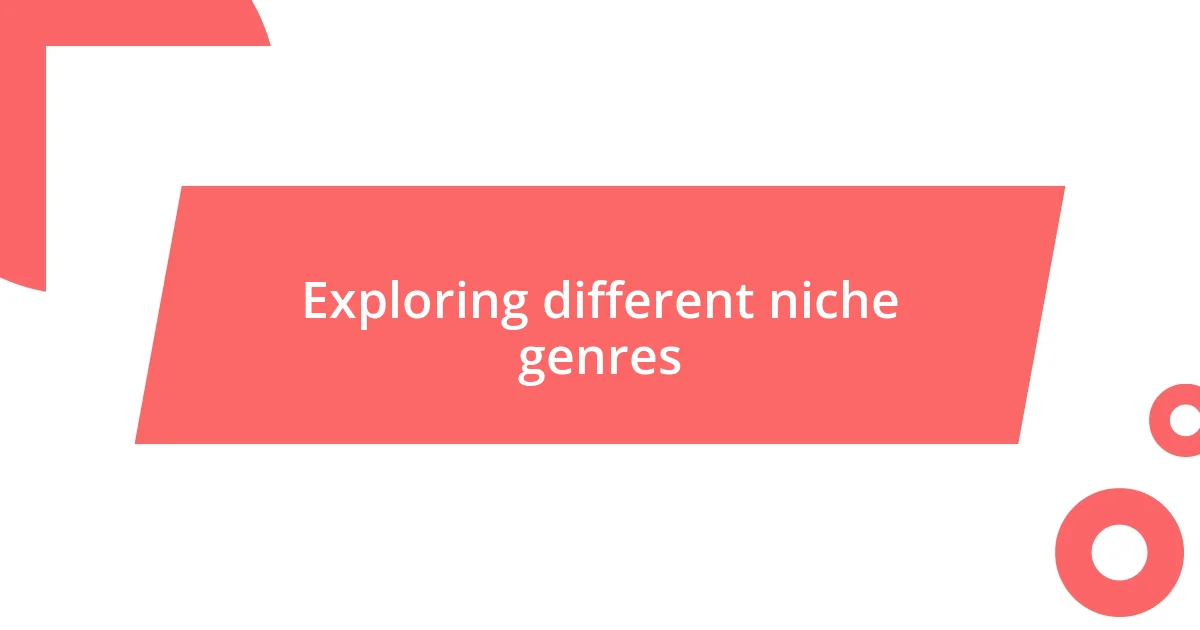
Exploring different niche genres
Exploring niche genres can be an exhilarating journey, often leading me to unexpected places. I think back to when I discovered the realm of dark fantasy. Initially hesitant, I dove in, and I was met with tales that blended myth with moral complexity. It was a stark contrast to the lighter reads I often gravitated towards, but that complexity proved to be deeply rewarding. Have you ever found yourself captivated by a genre you didn’t think you’d enjoy?
One of the joys of niche genres is that they often expose us to new cultures and perspectives. Recently, I explored the subgenre of Afrofuturism, which combines African mythology with futuristic settings. The vibrant worlds and rich characters opened my eyes to narratives that challenge the dominant cultural paradigms. Isn’t it enlightening how literature can transport us to realms far removed from our everyday lives?
When I consider the variety within niche genres, it becomes apparent that they function like a rich tapestry of storytelling. Each strand tells a unique story, whether it’s the heartfelt narratives found in LGBTQ+ romance or the gripping plots of psychological thrillers. I was surprised at how different they all felt, yet how each genre offered up new avenues for exploration and reflection. Isn’t it exciting to think about what hidden gems we might uncover just by venturing outside our usual reading habits?
| Niche Genre | Key Characteristics |
|---|---|
| Cozy Mystery | Wholesome settings, amateur sleuths, lighthearted tone. |
| Speculative Fiction | Explores imaginary concepts, often challenges reality. |
| Dark Fantasy | Merges fantasy elements with grim themes, moral ambiguity. |
| Afrofuturism | Combines African folklore and futuristic tech, diverse narratives. |
| LGBTQ+ Romance | Focuses on relationships within LGBTQ+ contexts, emotional depth. |
| Psychological Thriller | Intense mind games, character-driven suspense, emotional tension. |
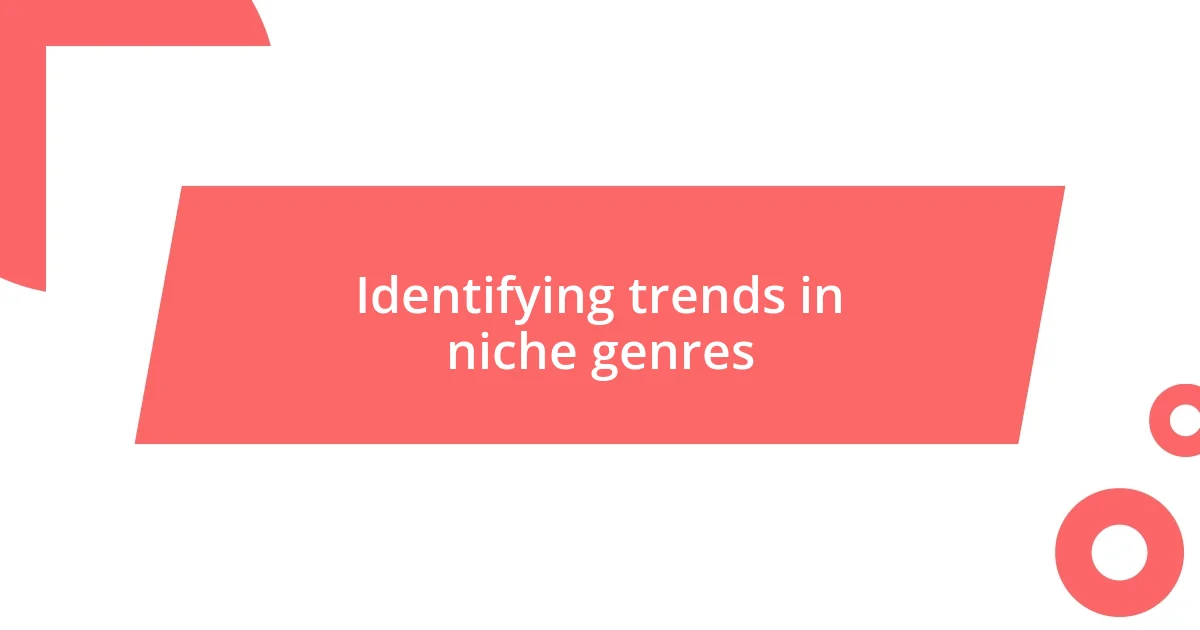
Identifying trends in niche genres
As I delve deeper into niche genres, certain trends start to emerge that pique my interest. For instance, I’ve noticed a growing inclination towards representation and inclusivity. It’s heartening to see how readers, including myself, are increasingly drawn to stories that reflect diverse voices and experiences. This shift has led to a blossoming of subgenres that break traditional boundaries, offering narratives that resonate on multiple levels.
- Emergence of hybrid genres, like fantasy romance or historical thrillers.
- Increased focus on mental health themes and emotional experiences.
- A rise in female-centered narratives, showcasing strong characters.
- Blending cultural elements, leading to richer storytelling.
- More interactive storytelling formats, including graphic novels and audiobooks.
I remember picking up a LGBTQ+ fantasy novel, and it truly opened my eyes to the richness of identity and love in fantastical settings. It felt like stepping into a vibrant world where acceptance flourished. Engaging with these unique stories not only entertained me but also fostered a sense of connection with the characters. It’s fascinating how niche genres can capture these shifts and reflect our evolving societal conversations.
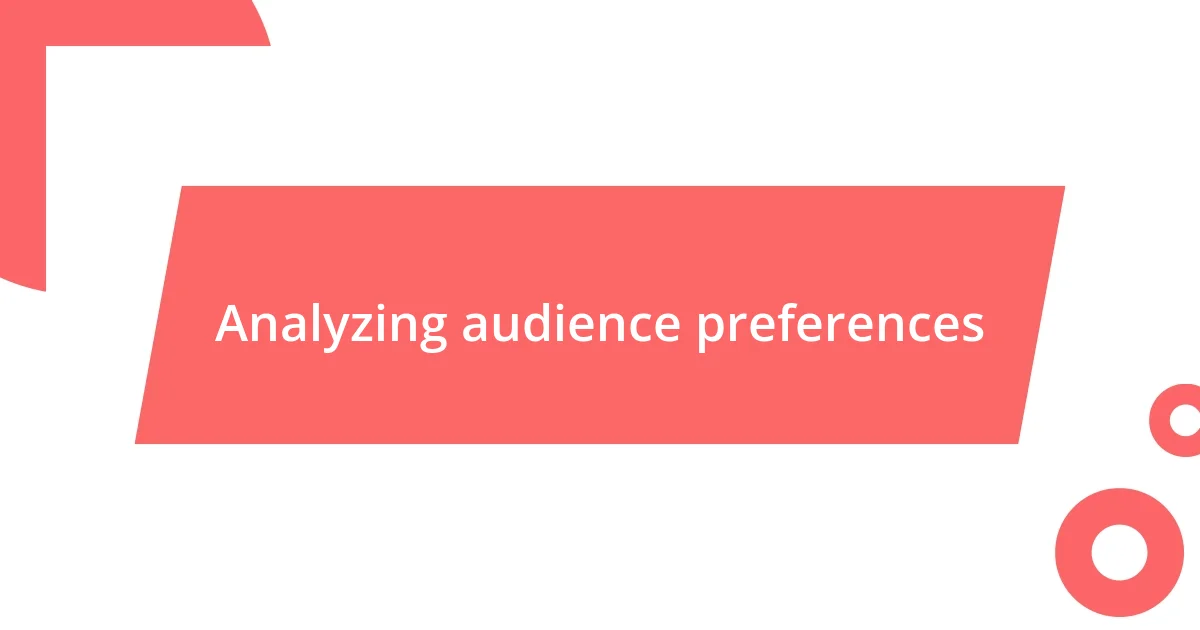
Analyzing audience preferences
I’ve often found that understanding audience preferences is like peeling back layers of an onion. One time, while participating in a book club, I was astounded to see how my friends gravitated towards different genres. Some cherished the gripping tension of psychological thrillers, while others thrived on the warmth of cozy mysteries. It made me question: what drives these preferences? It seems that personal experiences often shape the types of stories we seek out.
As I’ve explored niche genres, I’ve recognized how they cater to specific emotional needs and desires. For instance, I’ve seen readers who enjoy Afrofuturism connected with its themes of resilience and hope. These narratives not only present imaginative worlds but also resonate deeply with struggles that feel familiar. Isn’t it intriguing how stories can serve as mirrors reflecting our own lives and aspirations?
In my journey, I’ve also noted how trends shift based on societal moments. During times of uncertainty, genres focusing on mental health or community come to the fore. This past year, the surge in LGBTQ+ romance caught my attention; it was heartening to see people embracing love stories that celebrate diversity. Isn’t it wonderful how literature can encapsulate the zeitgeist, allowing us to explore our emotions and connect with others who share similar experiences?

Evaluating successful niche examples
When I think about successful niche examples, certain titles instantly come to mind. Take, for instance, a graphic novel I recently devoured that wove together elements of mystery and magical realism. The way the illustrations enhanced the story made me feel as if I was part of that world, which is something I rarely experience in traditional prose. It’s fascinating how niche formats can elevate storytelling in a way that resonates deeply with readers like myself.
One trend that stands out is the rise of female-centered narratives, like the ones found in quirky rom-coms set against fantastical backdrops. I remember reading a novel where a female lead not only fought dragons but also battled her inner demons. It was such a refreshing take! This dual exploration of strength and vulnerability encouraged me to reflect on my own life challenges. Isn’t it incredible how these characters can inspire us to confront our personal struggles with newfound courage?
Furthermore, witnessing the blend of cultural elements in stories has truly enriched my reading experience. I recently stumbled upon a historical thriller that intricately wove in traditional folklore, and it sparked a sense of nostalgia for my own heritage. It prompted me to ask: how often do we see our own experiences mirrored in the genres we love? These niche examples don’t just tell stories; they build bridges between cultures and create an emotional tapestry that captivates a broad audience—something I believe every reader appreciates at some level.
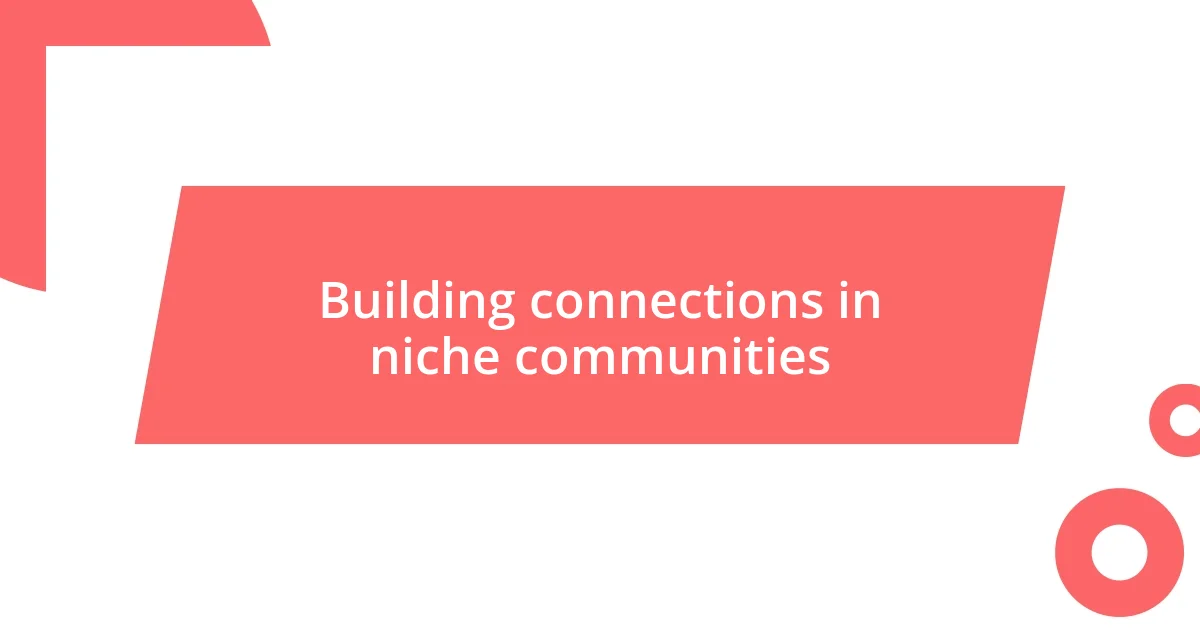
Building connections in niche communities
During my exploration of niche communities, I discovered that genuine connections stem from shared interests. I remember joining an online forum dedicated to a specific sub-genre of fantasy. The warmth of camaraderie was undeniable; we exchanged book recommendations and discussed plot twists enthusiastically. It felt like I had found a family that truly understood my passion!
As I engaged with fellow enthusiasts, I realized how these connections often lead to deeper conversations about creativity and personal journeys. One fellow reader shared how a particular series helped them through a tough time. Hearing their story made me reflect on the power of literature as a lifeline, and it struck me: isn’t it powerful how stories can unite us through our struggles?
Interestingly, I’ve found that participating in niche communities often fosters collaboration and innovation. I once joined a project where writers created an anthology exploring mental health through speculative fiction. This collaborative effort not only broadened my creative horizons but also deepened friendships. How often do you find yourself uplifted by the unexpected connections you make in these spaces? For me, those moments are what truly elevate the experience of exploring niche genres.


